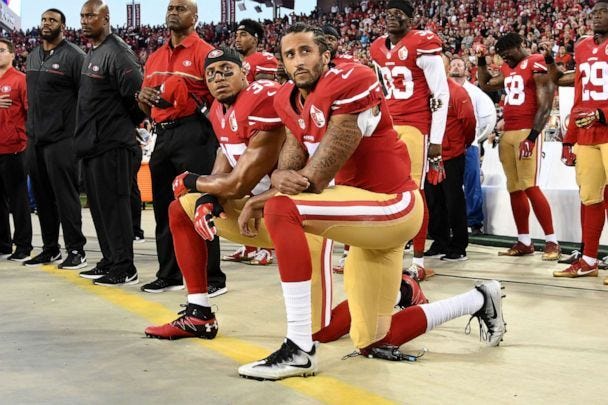In 2016, San Francisco 49ers quarterback Colin Kaepernick quietly began a protest against systemic racial injustice in America, when he remained seated on the bench during the playing of the national anthem.

The following week, after consulting with a military veteran teammate about conducting his protest as respectfully as possible, he began kneeling during the anthem instead. Over the course of the next several years, these actions would ignite a firestorm of criticism, drawing fire toward the NFL from both ends of the political spectrum. Many believe — and with good evidence, such as the continued employment of measurably-worse players such as Nathan Peterman and Brandon Weeden — that Kaepernick’s protests caused him to be blackballed from the league.
The NFL made a significant move that they hoped would address the public relations end of this last week, when they announced a partnership with hip-hop mogul Jay-Z and his company Roc Nation. Though it was portrayed by the parties involved as a step toward inclusivity for the league, many viewed it as nothing more than attempt by the league to save face.

Carolina Panthers safety Eric Reid, a former teammate and vocal supporter of Kaepernick, was blunt. “Jay-Z claimed to be a supporter of Colin,” Reid told reporters. “Wore his jersey, told people not to perform at the Super Bowl… and now he’s going to be part owner. It’s kind of despicable.”
Others just wish that everyone involved could “stick to sports”. That’s the common refrain any time political or social issues come to the forefront in sports — we’re told to focus only on the game, rather than on the issues that affect the people involved. Just last week, Deadspin editor Megan Greenwell stepped down from her position under continued pressure from the new private-equity owners of G/O Media to “stick to sports”. (A ludicrous notion, considering the online publication’s long history of doing anything but.)
When people push this refrain — “stick to sports” — their claim, whether explicit or implied, is that the person they’re addressing, whether it be a player, a member of the media, or a fellow fan, has inserted politics into a place where it doesn’t belong. That you’re ruining something that should be pure and fun and never unpleasant.
What they’re really saying, though, is: the deal is working for me. I don’t want to be bothered by anyone who it’s not working for.
There’s no sticking to sports, because the contradictions of sports are the contradictions inherent in all of American life. Labor issues, free expression, racial justice — they’re inextricably woven into the fabric of sports. On a special episode of The Seventh Circle Podcast that released last night, we take time to discuss these issues in depth with Dr. Ricky L. Jones, professor and Chair of Pan-African Studies at the University of Louisville, a prominent social commentator and avid sports fan. It’s a discussion that breaks from our usual format, but one that we believe is important for everyone who care about sports and about society to engage in.
“People don’t change, societies don’t change, if people just sit in rest and wallow in their blankets of comfort,” Dr. Jones noted, toward the end of our discussion on this episode. “That blanket has to be pulled off of them, and they have to be pushed out naked into the freezing cold, so that they can suffer in and deal with the reality of the elements we’re all facing. That’s the way we build a better world. So when people say ‘stick to sports’, they’re saying ‘just entertain me’, and that’s one of the most insulting things you can say to someone… we can all grow from the foil of sports. They’re doing not just themselves, but the country a disservice. Put sports in their place. We love them. Yeah, we can entertain with them — but we can educate with them, too, because they accentuate American contradictions.”
Thanks for reading and for listening to The Seventh Circle Podcast. As always, find us at CircleSevenPod.com, on Apple, Google, Spotify, Stitcher and almost anywhere podcasts are found.


